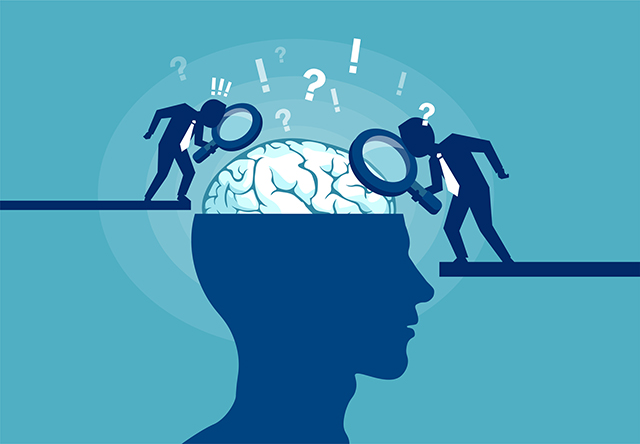What's On This Page?
ToggleThere are a few words that terrify people the second their physician utters them. One of them is Alzheimer’s disease. When you hear that word, it’s like time stops. Nothing can prepare you for the idea that you will one day forget decades of special memories and the people with whom those memories were created.
A new report has studied the fear that we have of Alzheimer’s. It’s published in the journal, American Journal of Alzheimer’s Disease & Other Dementias and the article title is “The Influence of Psychosocial and Cognitive Factors on Perceived Threat of Alzheimer’s Disease.” In it, researchers had 1,641 adults over the age of 50 fill out questionnaires. The participants were split 54:46 female to male. The results revealed that certain factors are known to increase our fear of developing Alzheimer’s.
What are the three factors increasing the fear of developing Alzheimer’s?
1. Stress
2. Genetics
3. Self-determined faulty memory
Stewing about these factors doesn’t necessarily mean you’re going down the rabbit hole. However, these insights are important to helping shape practices for early detection and certain policies in a clinical setting.
I worry more about you getting diagnosed with Alzheimer’s when you don’t have it! That’s the sad reality and it happens probably every single day to someone. How do I know? People get smacked with labels constantly, and are dropped into the sinking ship called the “medical system” that is frequently too quick to cut, poison and burn. There’s a difference between an ailing memory and Alzheimer’s disease. It’s common sense.
This is pretty scary to me and should be to you as well. The average retail price for a one-month supply of a popular Alzheimer’s medication is $496.58. Well-meaning doctors don’t think twice about prescribing heavy duty medications. And of course big pharma companies are pushing them and promoting their virtues, but these virtues don’t apply to every person who takes them.
According to preliminary results from a new study presented recently in London, diagnosing Alzheimer’s is a guessing game. Doctors evaluated 4,000 Medicare patients who had mild cognitive impairment or dementia, and discovered that many of them definitively do not have Alzheimer’s! Could you be one of those seniors with reduced memory function, but not actually Alzheimer’s disease? The treatment differs, you know.
So unfortunately, Alzheimer’s is a guessing game.
We know patients tend to have sticky clumps of beta-amyloid in their brains. You can see these using PET-scans (often not reimbursed), or via painful spinal taps. So obviously most people do not endure these expensive and/or invasive procedures. They are told they have Alzheimer’s anyway, without a definitive diagnosis, often based on their poor memory recall or recent personality changes.
There’s a new blood test in development that I’m excited about. It’s not available right now but it was tested in a small group of people. More testing is needed on larger groups of people. Regardless, this blood test will be able to detect whether or not plaques of beta-amyloid are building up your brain, which again, is a sign that you may develop Alzheimer’s disease. (It’s a clue, it’s not a certainty.)
Think of this blood test as a screening test, similar to the way we do annual checks on cholesterol. Again, it’s still in development so you can’t get it now. “Our results demonstrate that this amyloid beta blood test can detect if amyloid has begun accumulating in the brain,” according to Dr. Randall J. Batemen who shared the news in London. He continued, “This is exciting because it could be the basis for a rapid and inexpensive blood screening test to identify people at high risk of developing Alzheimer’s disease.”
Plaques start developing 15 to 20 years before symptoms of Alzheimer’s disease begin, so testing positive would NOT mean that you’re getting it, but at least you could be proactive if your blood test was positive. And a blood test like this is thousands of dollars cheaper than what we rely on now to see plaques (i.e., PET scanning).
Before we leave the topic of plaques, some of you reading my article today have already been tested for that. I want to assure you that plenty of people with plaques do not have Alzheimer’s. I also want it clear that people with Alzheimer’s may also not show placquing. It goes both ways.
What I don’t like is the indiscriminate labeling of people with serious conditions.

Some practitioners don’t think with enough compassion or they wouldn’t toss the word “Alzheimer’s” out so fast. I’ve been on the other side of this; not personally but close enough to see how lives and finances can become catastrophic due to one word, perhaps “mold”, or “Lyme” or “InsertScaryDiseaseHere.” It’s common practice to diagnose a person without supporting tests or lab work.
Think of how frequently antibiotics are doled out when your infection is viral.
This is just an example of course, there are many other instances in which diagnoses are made from “exclusion” of symptoms, which can be torturous to someone. I know one lady who was told she had pancreatic cancer and she wrapped up her life in three weeks, then she got a call and said that it was a mistake.
My mom was told she had diabetes a long time ago when she actually had statin-induced hyperglycemia. Diabetes is a disease, which she most definitely did not have. Her blood sugar was high due to a drug side effect, and it resolved very quickly because I showed her what was happening (plus she went off the statin). My dad was pinned with Alzheimer’s recently but his memory is sharp as a tack. His mind is perfect, he is absolutely as normal as can be for an 89 year old man! My list could go into the hundreds but I’ve made my point. (Well, okay, one more point because it hits close to home.)
People lately have been told they have Lyme disease in the absence of definitive proof, and are treated with expensive, painful intravenous injections, oral antibiotics that can make you go crazy, hydrogen peroxide and more… only to not respond and later realize they probably don’t have it. You can read more about Lyme disease in my other article by CLICKING HERE.
I want to get back to the brain now and our discussion of Alzheimer’s. Some things are measurable, even if they don’t define the condition. For example, quinolinic acid. It’s seen as QUIN in the scientific literature in case you do a search online. I first told you about QUIN back in 2001.
Quinolinic acid is formed in everyone from the substrate tryptophan or L-tryptophan. This is an amino acid found in turkey and other meats, as well as many dietary supplements, protein powders and sleep aids. Since tryptophan is found in many foods, that’s most people’s primary method of ingesting it.
We eat food containing tryptophan and make quinolinic acid in our body as part of the Kynurenine pathway. But you don’t want too much quinolinic acid, as it’s a substance tied to cancer, anxiety and hundreds of other diseases.
I read an article published in Neuropathology and Applied Neurobiology that found evidence that the Kynurenine pathway gets touchy-touchy in people with Alzheimer’s. The pathway basically becomes hyperactive (or upregulated if you want the scientific term).
This causes higher production of quinolinic acid, which is an excitotoxin compound that ignites your brain! The researchers think that an enzyme in this pathway is on overdrive. The enzyme called IDO, working super fast, will crank out quinolinic acid faster than normal. IDO stands for Indoleamine-pyrrole 2,3-dioxygenase, which is the enzyme I’m referring to.
It’s bad. Now I’m not saying at all that tryptophan leads to Alzheimer’s, I’m just telling you the substrate used to make quinolinic acid. So for years, we’ve known that quinolinic acid is produced at a faster rate, and is suspect in the cascade of neurodegeneration seen in Alzheimer’s patients. I’m asking you, has your physician measured this compound in you? Do you know if it’s high or not?
Diagnosis is important.

I have lived long enough to see all kinds of crap, and I don’t trust labels and diagnoses. You’re healthy until proven not. You must learn to look at all the puzzle pieces. Quinolinic acid can be measured. Keep in mind that having high levels doesn’t automatically mean you have Alzheimer’s, though.
It is just one more puzzle piece. Could you be one of those people who is getting older, with a frail mind, and perhaps a reduced ability to recall… but actually not have Alzheimer’s disease?
This is all very important to determine. You may be potentially taking unnecessary Alzheimer’s drugs, and subjecting yourself and your own mind to thoughts of decline, which will then manifest.
My hope is that you can have a candid conversation with your physician soon, and find out what you have, and what’s really going on ‘upstairs.’
For some people, changes to your supplement and dietary regimen can help you with memory recall. If you do have Alzheimer’s, my hope is that you can find the best possible treatment to slow the decline. Maybe it’s possible for you to change your treatment to something less expensive, or even more effective, or add natural adjunctives that preserve your brain.
That is truly my goal. At the end of the day, my articles are intended to spare you unnecessary pain, expense and mental trauma. Share your own story with me by clicking here.

Suzy Cohen, has been a licensed pharmacist for over 30 years and believes the best approach to chronic illness is a combination of natural medicine and conventional. She founded her own dietary supplement company specializing in custom-formulas, some of which have patents. With a special focus on functional medicine, thyroid health and drug nutrient depletion, Suzy is the author of several related books including Thyroid Healthy, Drug Muggers, Diabetes Without Drugs, and a nationally syndicated column.



